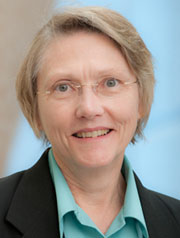 TALLAHASSEE, Fla. – Nancy Hayes, Ph.D., a neurobiologist whose research has focused on genetic regulation of variability in the brain, has accepted an offer to fill the newly created position of director of clinical foundations (year 1 and 2) at the Florida State University College of Medicine.
TALLAHASSEE, Fla. – Nancy Hayes, Ph.D., a neurobiologist whose research has focused on genetic regulation of variability in the brain, has accepted an offer to fill the newly created position of director of clinical foundations (year 1 and 2) at the Florida State University College of Medicine.
Her appointment in the Department of Medical Humanities and Social Sciences will take effect Sept. 1.
Hayes, currently associate professor of neuroscience at the Robert Wood Johnson Medical School in New Jersey, will serve to develop and implement an effective review process for the Florida State College of Medicine curriculum.
“I am very pleased to welcome Dr. Hayes to our College of Medicine. She has superb academic credentials and was one of the early developers of an integrated curriculum in New Jersey in her role as Neuroscience Course Director,” said College of Medicine Dean John Fogarty. “I look forward to her innovative and collaborative approaches to ensuring that our curriculum meets the needs of future medical students.”
She will work with Curtis Stine, M.D., associate chair in the Department of Family Medicine and Rural Health and director of clinical programs (year 3 and 4). They will evaluate courses, clerkships, and the four-year curriculum to ensure that it is integrated, developmental- and competency-based. Working in collaboration with the Year 1 & 2 and Year 3 & 4 curriculum sub-committees they also will make recommendations to the curriculum committee, and to the Office of Medical Education, for the resources needed by faculty to implement the curriculum.
Hayes has served as chair of the first-year course directors committee at Robert Wood Johnson Medical School, where she also is a member of the curriculum task force.
“One of the things that attracts me to the College of Medicine at Florida State is its openness to new ideas and commitment to continual improvement,” Hayes said. “Medicine, contrary to common opinion, is the oldest profession, but its demands are always new."
Hayes, as a decorated neuroscience teacher, will be involved with teaching and mentoring medical students, along with her responsibilities with the curriculum.
In 2009, she received the RWJ Medical School’s Excellence in Teaching Award. Earlier this year, she was selected to receive the 2010 Professor Richard A. Harvey Excellence in Teaching Innovation Award. The honor recognizes the medical school faculty member who has made the most innovative contributions to teaching during the previous year.
Hayes was recognized for having produced significant advances in the medical school’s existing web-based system for the neuroscience course. She added tutorials and self-assessment modules to allow students to evaluate their understanding of the subject.
“Not only is Nancy an excellent and exciting lecturer with incredible mastery of her subject, but she turns students into active learners and critical thinkers,” said Siobhan A. Corbett, M.D., associate professor of surgery and chair of the curriculum committee at RWJ Medical School.
Hayes has shared her curricular innovations in workshops for local colleagues and at the "Gateway to Where?" symposium of the Northeastern Group on Educational Affairs of the Association of American Medical Colleges.
"Medical education needs to evolve to accommodate the explosion of medical knowledge. To be a good physician, you have to be a good scientist,” Hayes said. “That means being able to ask good questions and evaluate the available information. Our job as educators is less about the transfer of information than about developing a culture of inquiry in our classrooms and in our students. I've been enormously impressed by the faculty at Florida State and by their commitment to education."
Hayes took a non-traditional path to her current position and looks forward to applying dual perspectives in research and teaching to her new role at Florida State.
“People are usually surprised when they learn that I went from an undergraduate major in Russian literature to neurobiology, but it makes perfect sense,” Hayes said. “The nervous system is what allows us to communicate with our environment, just as language and storytelling allow us to communicate with one another. It's not surprising that communication skills are one of the cardinal competencies for physicians."

